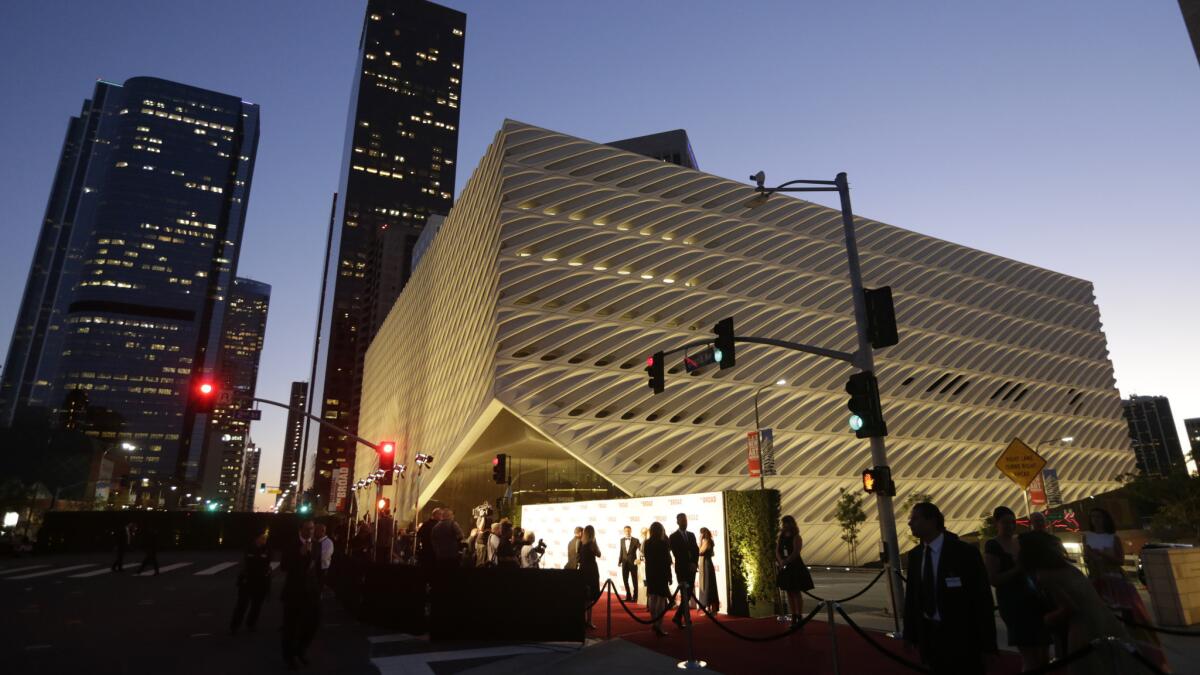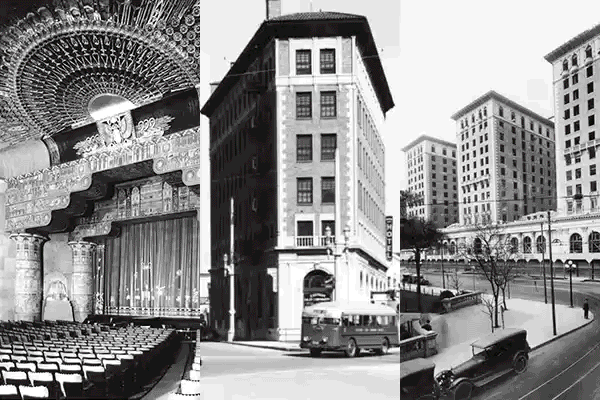Star-studded gala celebrates Broad museum -- and transformation of downtown L.A.

The gala red carpet runs into the new Broad museum Thursday night in downtown Los Angeles.
- Share via
A parade of tiny paper sculptures, all re-creations of cultural institutions along Grand Avenue, glowed atop the dinner tables Thursday night at the black-tie gala for the new Broad museum — fitting as the evening was as much a celebration of downtown L.A., particularly the Grand Avenue corridor, as it was an inauguration of Eli and Edythe Broad’s long-awaited museum of contemporary art.
The LED-lighted centerpieces, inspired by Edythe Broad’s pop-up book collection and designed by Los Angeles artist Renee Jablow, included the honeycomb-like Broad museum amid a boxy Colburn School and a tiny, sweeping Walt Disney Concert Hall, among others.
“This area has come alive,” Mayor Eric Garcetti said. “We’re emphasizing, in L.A., a real street life and kind of assuming the mantle regarding the creative crossroads of the world. L.A. is the creative capitol; it’s shifted west. Not just the institutions, but the creators we house. And the Broad punctuates this.”
SIGN UP for the free Essential Arts & Culture newsletter >>
The event brought together art world stars such as Catherine Opie, Mark Grotjahn and John Baldessari; civic leaders and government figures like state Attorney General Kamala Harris, and Hollywood celebrities including Gwyneth Paltrow and Owen Wilson.
They all gathered inside a translucent gala dinner tent perched atop a parking structure on Grand Avenue and aglow with gleaming lanterns dangling from the ceiling. On one side: City Hall, luminescent against the inky night sky. On the other side: Disney Hall’s metallic curves and the milky, dimpled facade of the Broad.
Walking to dinner from the cocktail reception held outdoors in front of the new museum, former City Councilwoman Rosalind Wyman — in 1953, the second woman to be elected to the position — said she was almost moved to tears. Wyman helped Dorothy Chandler to address the council back when the latter was raising money to build the Music Center down the street.
“I stood there looking at the Broad and almost cried,” Wyman said. “It’s a jewel. And Disney Hall and Grand Park. It’s amazing when you think what it was like here in the ’50s and ’60s. It was junky, and now, it’s a miracle. It’s just overwhelming.”
The evening started on the red carpet, where in one quick glimpse, onlookers could see artists Doug Aitken, Museum of Contemporary Art Director Philippe Vergne, former L.A. County Supervisor Zev Yaroslavsky and actor Tobey Maguire.
Opie said she is a fan of the Diller Scofidio + Renfro-designed building.
“I was just photographing it from over there,” she said, pointing across the street toward a building under construction, for which she’s creating a series of photographs. “I was shooting it [the Broad] from the roof because it’s just so beautiful.”
Baldessari, looking sharp in a white jacket and sneakers, was quick to point out the global importance of the new museum.
“This isn’t just about L.A. but the world,” he said, “because it’s really a major museum when you think of the caliber of the collection.”
Making his way down the carpet, Takashi Murakami seemed enthused if a bit ill at ease. The artist has five works in the museum’s inaugural exhibition, which he had not seen installed yet. Later, however, when guests were allowed to wander the 50,000 square feet of gallery space during the cocktail reception, Murakami stood in front of one of his paintings, gazed up at his pile of skulls, tracing the lines in his palm.
“What are you doing?” asked MOCA board co-chair Lilly Tartikoff Karatz.
“I just can’t believe I did this,” Murakami replied. “I don’t think I could do that again!”
Jeff Koons said he was honored that his multicolored, stainless steel tulips sculpture had been given a place of honor, front and center, as guests stepped off the escalator into the third-floor gallery.
“The Broad has the largest collection of my work in the world,” he said. “I think of this museum as my Philadelphia; they have the largest collection of [Marcel] Duchamp. The generosity of the Broads, it’s just unparalleled.”
Outside by the bar area, Eli and Edythe Broad, king and queen of this ball, held court in tall pearly white chairs positioned beneath the museum’s “oculus,” where the building’s boxy shell yields to a gentle curve.
“It’s just very gratifying,” Eli Broad said of finally seeing his vision for the museum come to life. Years ago, the Broads had considered Santa Monica and Beverly Hills for the museum, but downtown, Eli said, “is absolutely the right place for it. I’ve always believed Grand Avenue could be a cultural and civic center — and now it’s finally happening.”
Mark Bradford also was in high spirits, greeting passersby in front of his mixed-media piece “Corner of Desire and Piety, 2008.”
“Oh, my God, you look so cuuute,” he said, throwing his arms around a woman in a crinkly, sapphire-blue gown.
Regarding his Hurricane Katrina-inspired piece, which hangs in a prominent spot in the Broad’s third-floor atrium, Bradford was more sober: “I just feel satisfaction,” he said looking up at the work. “It feels like it found a new home, that it’s going to have a whole new conversation here than in New Orleans.”
Standing in front of Damien Hirst’s candy-colored “Chlorpropamide (pfs), 1996,” Barbara Kruger summed up her sentiments: “Wow!” she said, looking around the room. “Just wow.” Then she added: “Eli loves L.A. But this is really a global site for culture, as is the museum across the street,” she said, a reference to MOCA.
At that moment, just as the dinner bells were ringing, LACMA Director Michael Govan descended the escalator and gave a museum worker an enthused thumbs-up. He soon was followed by MOCA’s Vergne, who also gave a thumbs-up as he rode down. In the lobby, Vergne elaborated.
“I used to think more is more,” he said. “But I was wrong. A lot of more is better. I got vertigo in there. My head is spinning. It’s amazing.”
As guests made their way across the street to the dinner tent, live orchestral music filled the air. Atop the ramp leading to the tent’s entrance, Broad architect Elizabeth Diller paused and looked back at the sweeping view of the museum and Disney Hall.
“I’ve never seen it from this point of view before,” she said. “It’s a very disembodied experience — but in a good way.”
The museum’s founding director, Joanne Heyler, called the evening “an immersion in an urban perspective of L.A.”
During dinner — a collaboration between Wolfgang Puck and Timothy Hollingsworth, chef of Otium, next to the Broad — Eli Broad received an uproarious standing ovation even before taking the microphone onstage, but he was quick to deflect the attention.
“Edye was our family’s first collector,” he said, “and she got me interested in art.”
Much lively table-hopping ensued during dinner. At one table, actor Wilson hunkered down in intense conversation with artist Julian Schnabel. Standing by another table, architect Frank Gehry compared notes with Diller.
Paltrow said she was particularly impressed with the scale of the Broad galleries and the art itself. “It feels like it’s an exciting time to be living in L.A.,” she said.
And so it went, until electric guitar chords reverberated throughout the room, cutting the din. The white stage curtain rose, revealing the musical guest for the evening: Chrissie Hynde.
Rosanna Arquette jetted to the front of the room, clapping her hands and rocking back and forth, clearly a fan.
The Pretenders frontwoman strutted across the stage in skin-tight black jeans, wielding a sparkly silver guitar. She opened with a cover of the Chip Taylor song “Angel of the Morning,” but the rest of her 30-minute set consisted of Pretenders hits, including “Chain Gang” and “Don’t Get Me Wrong.”
Between songs, Schnabel darted to the edge of the stage and whispered a request to the singer. “I’ll Stand By You,” he said, returning to his seat and shrugging his shoulders. “She would have probably played it anyway.”
After Hynde’s set wound to a close, the cavernous tent emptied out, leaving behind a multicolored, mashup of lights, somewhat reminiscent of Yayoi Kusama’s “Infinity Mirrored Room” at the Broad.
There were the still-glowing ceiling lanterns; the wall of shimmering, blue star lights behind the now-empty stage; the Grand Avenue buildings, including the Broad, bathed in diffuse, late-night street light; and not least of all, the tiny paper buildings, still lighted from within and flickering, as if welcoming the museum to the neighborhood.
Twitter: @debvankin
More to Read
The biggest entertainment stories
Get our big stories about Hollywood, film, television, music, arts, culture and more right in your inbox as soon as they publish.
You may occasionally receive promotional content from the Los Angeles Times.











